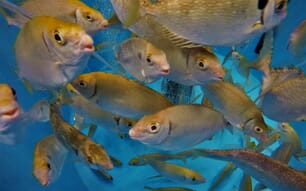The discards issue - which has also garnered public attention - is also being addressed in reform proposals for the new Common Fisheries Policy.
Now the Scottish fishing industry is funding research at the University of Aberdeen into effective ways of monitoring with the use of remote electronic monitoring or REM the discarding of fish at sea.
It is hoped that the findings of the research - being funded by the Scottish Fishermens Trust - will help advise decision makers and industry on fisheries management.
REM has been developed as a tool for monitoring fish discards to help with fisheries management and the rebuilding of cod stocks.
REM involves fitting fishing vessels with CCTV cameras and sensors to monitor the catching and processing of fish at sea.
CCTV footage and instrument recordings are then examined onshore to quantify both the species and amounts being discarded.
REM is a key element of Scottish Government policy for managing fisheries and its importance will increase as more vessels and more species are included in conservation initiatives like the Catch Quota schemes.
But for this technology to be beneficial to fish stocks, the Scottish fishing fleet and the wider ecosystem, sound scientific knowledge is required about its accuracy and cost effectiveness.
The Scottish Fishermens Trust has given 4,825 towards the research project which will help deliver some of those insights.
Evaluating Observer Effects in Discard Sampling is the name of the project being conducted by University of Aberdeen graduate Rosanne Dinsdale under the supervision of Mr Coby Needle of Marine Scotland - Science and Dr Tara Marshall of the University of Aberdeen.
Dr Marshall said: REM and CCTV cameras were introduced quite recently to the Scottish fishing fleet and elsewhere in Europe as a new way of helping with the management of fisheries."
Traditionally human observers have worked onboard fishing vessels to monitor the species and amounts being caught. However there is concern that the presence of an observer will influence discarding practices making the data that are collected inaccurate."
The aim of this project is to compare the discarding rates estimated by a human observer with discarding rates determined by CCTV monitoring. Footage from a single vessels fishing out of the North Sea in 2010 and 2011 will be analysed over the summer.
This project builds on earlier research conducted last year by Ms Dinsdale who examined the use of REM by the Scottish whitefish fleet as part of her honours research project.
For that study she analysed 19.5 hours of CCTV footage and counted approximately 21,000 discarded fish representing more than 25 different species.
Ms Dinsdale said: We hope that this research will help provide the fishing industry and policymakers with the information required to sustainably manage our fisheries.
James Brown, Chairman of the Scottish Fishermens Trust, added: The Scottish fishing industry takes the subject of discard reduction seriously. The Evaluating Observer Effects Project will help inform managers and industry on how best to address this complex problem in future.
Fishermen's Trust Supports Discards Research
SCOTLAND, UK - Scottish fishermen have been spearheading a range of initiatives to reduce the problem of discarding of fish at sea - including the use of more selective types of nets and real time fishing closures.




